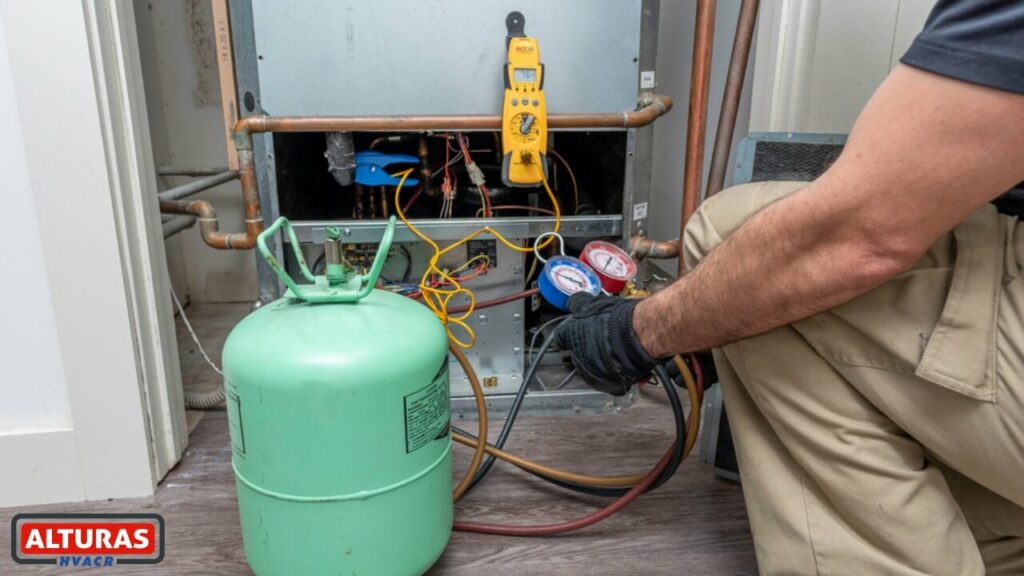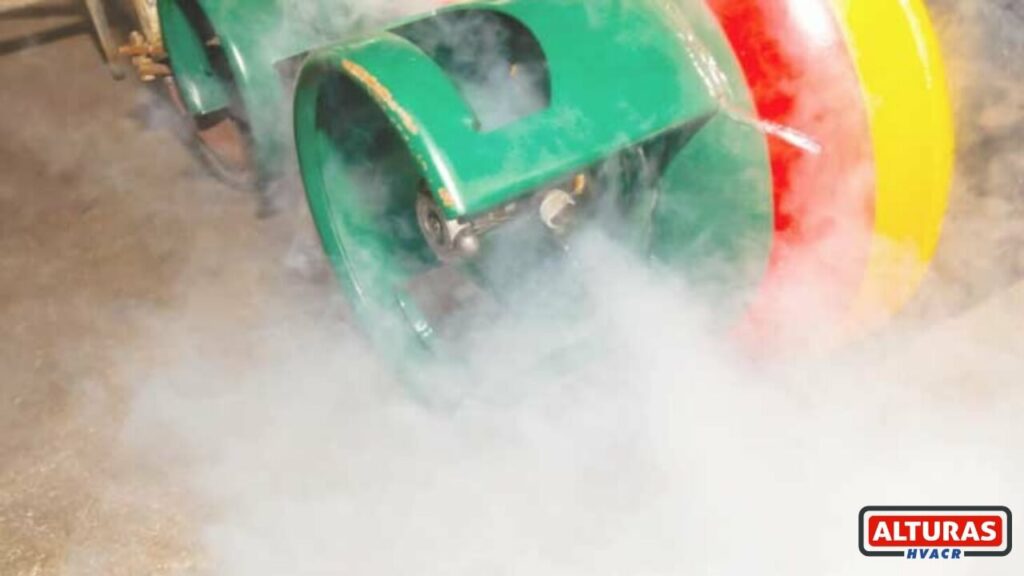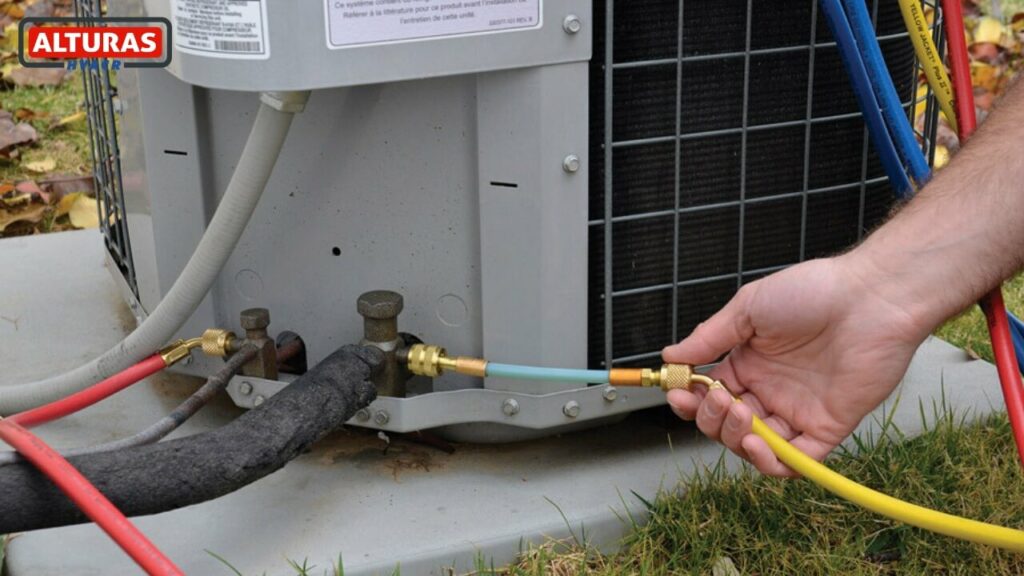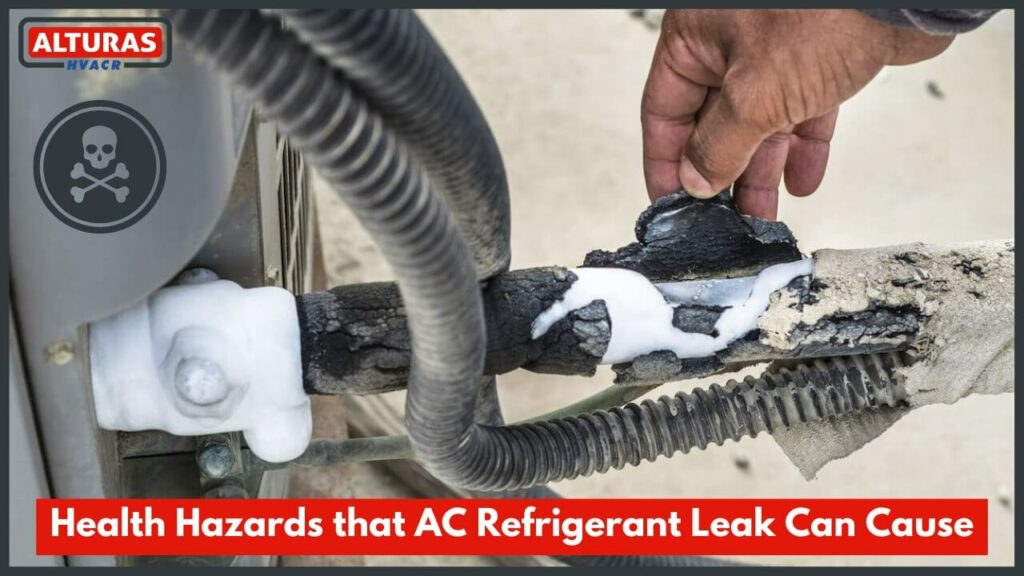A heating and air conditioning system is the most essential equipment for any residential or commercial area. It keeps you comfortable during the changing outdoor temperatures. Therefore, a malfunctioning AC can be a nuisance, especially in extreme weather. There can be many reasons for an air conditioner to malfunction. One of the most ignored reasons can be AC refrigerant leaks. A refrigerant is one of the most imperative but at the same time, most overlooked parts of your air conditioning system.
What is a Refrigerant?
An air conditioner requires coolant to cycle both cold and hot air and disperse it properly. This coolant is within the unit’s copper tubes. Afterwards, it cycles through to circulate cold air and expel hot air outdoors. This chemical blend is responsible for cycling through the system, changing from a liquid to a gas as it absorbs and releases heat from inside your home. However, over time, issues in your line sets can lead to the loss of refrigerant, which can cause many problems. This can cause your AC to malfunction.
Aside from a dysfunctional air conditioner, many health problems may arise out of refrigerant leaks. If you neglect a leaking air conditioner, this coolant can severely affect your physical health. This guide will teach you the refrigerant leak symptoms and dangers.
6 Major Signs Of AC Refrigerant Leaks

Here are six common signs of air conditioning refrigerant leaks:
Humidity
Air conditioners remove air from indoor spaces and dehumidify. When there’s a refrigerant leak, an air conditioner’s dehumidifying ability is just as compromised as its cooling ability.
Poor cooling
If you suddenly experience sweating and your system can’t keep up during the hottest hours of the day, a refrigerant leak can be a culprit.
Long cooling cycles
Longer cooling cycles are another sign of a possible refrigerant leak. Although it’s most of the time not noticeable, your air conditioner might be lagging a few degrees behind your thermostat setting. The sound of air moving through your vents makes it easier to notice if cooling cycles are abnormally long.
Higher utility bills.
If you completely overlook all the symptoms described above you may see a red flag in your next power bill. The inefficient cooling and longer cycles caused by low refrigerant can cause your electricity bills to rise.
Ice on evaporator coils
Some of the most obvious telltale signs of a refrigerant leak can be observed on your outdoor air conditioning unit. If you can see frosty ice crystals forming on the evaporator coil during hot weather, it’s time to call for an HVAC service provider.
Bubbling or hissing sound.
If you hear unusual sounds coming from your outdoor unit while it isn’t running, it could be a sign of a significant refrigerant leak.
What Causes Refrigerant Leaks in Air Conditioners?
There are many causes of AC freon leaks. Common catalysts of refrigerant leaks include:
- With continuous and excessive use, the copper tubes that house and distribute the coolant may begin to corrode. Furthermore, older units that utilize older refrigerants are more prone to corrosion as the chemical makeup of refrigerant is a catalyst for corrosion in its transformations from liquid to gaseous states.
- Factory defects are a common cause of refrigerant leaks.
- Ensure that your Air conditioner installers are professionals and expert technicians. Improper installation of an Air conditioning unit can result in air conditioner leaks and many additional problems. These problems can be more costly.
- Air conditioners experience wear and tear with time like any other frequently used appliance. Therefore, it’s important to keep an eye on the functionality of your unit as it ages.
- The storage of this coolant is within the unit’s copper tubes. The vibrating of your AC may be a cause or an indicator of a coolant leak in your system.
Dangers of AC Refrigerant Leaks

Refrigerant is made of chemical compounds such as chlorofluorocarbons, chlorine, and fluoride. Many health and environmental dangers can come with having contact with these chemicals. Therefore, it’s important to be aware of how air conditioner leaks may harm your health.
System inefficiency
The loss of refrigerant can cause your system to run inefficiently. Your system may struggle to produce adequate air conditioning, preventing your indoor area from reaching the desired temperature.
Increase in electricity bills
A refrigerant leak not only causes your system to work harder, but it can also drastically increase your monthly energy bills.
Health Dangers Caused By AC Refrigerant Leaks
Refrigerant leaks from air conditioners and refrigerators pose serious health risks, particularly in cases of leaking Freon, a common refrigerant chemical. When refrigerant escapes from air conditioning systems, it can cause a range of health problems, even in small amounts. Exposure to refrigerant chemicals can lead to symptoms such as a burning sensation in the throat or eyes, difficulty breathing, and other serious issues. In extreme cases, refrigerant poisoning may occur, prompting visits to the emergency room
- Breathing chlorine or skin/eye contact with chlorine gas may result in a variety of health problems.
- Fluoride weakens the immune system, aggravation of kidney disease, and causes birth defects, and genetic damage.
- Moreover, Chlorofluorocarbons are common contributors to the depletion of the ozone layer.
- Refrigerant poisoning can furthermore lead to difficulty breathing, headaches, nausea, and vomiting. It causes skin and eye irritation and coughing.
If left untreated, the poisoning can lead to life-threatening issues, including the following:
- Labored breathing
- A buildup of fluid in the lungs
- Irregular heartbeat
- Confusion, mental fatigue
- Seizures
- Loss of consciousness
If you are experiencing any of the symptoms of refrigerant positioning, consult a doctor immediately.
How to Fix AC Refrigerant leaks?

Locate the Leak: Use specialized tools like UV dye or electronic leak detectors to pinpoint the exact location of the refrigerant leak in the AC system.
Assess the Severity: Determine the extent and seriousness of the leak to understand the necessary steps for repair or replacement.
Isolate the System: Shut off the AC unit to prevent further leakage and damage, ensuring safety during the repair process.
Repair Small Leaks: Use appropriate sealants or patches designed for AC systems to mend minor leaks in accessible areas.
Replace Damaged Components: Replace any severely damaged or corroded components such as hoses, connectors, or coils contributing to the leak.
Pressure Test: Conduct a pressure test to confirm the integrity of the system post-repair and ensure there are no remaining leaks.
Evacuate and Recharge: Remove any remaining refrigerant, vacuum the system to eliminate air and moisture, then recharge it with the correct refrigerant amount as per manufacturer specifications.
Check for Proper Operation: Turn on the AC system and verify that it functions correctly, providing adequate cooling after the repair or replacement.
Monitor for Leaks: Regularly inspect the AC system for a period to ensure that the repair was successful and no new leaks have developed.
Reach out to a professional Los Angeles HVAC contractor right away if you find any of the air conditioner refrigerant leak symptoms mentioned in the article. Our expert HVAC technicians in Los Angeles are professional in the installation, repair, and maintenance service of all types of HVAC equipment. We are available 24/7 at your service. Alturas HVAC specialists will come to your place and inspect, identify and repair any issues in your air conditioner.
Conclusion
An AC unit with refrigerant leaks can cause the HVAC system to work harder to absorb heat from your space, leading to higher energy bills and potential health problems. When there’s a leak in your air conditioning refrigerant line, the air conditioner struggles to cool efficiently, and this strain can affect human health by compromising indoor air quality. Addressing AC refrigerant leaks promptly ensures optimal performance and reduces the risk of long-term health issues associated with faulty air conditioning systems.
Common FAQs About Refrigerant Leaks
Can a Freon Leak Cause Health Problems?
Freon can irritate the respiratory system, which can cause coughing, wheezing, and shortness of breath. In severe cases, Freon exposure can cause respiratory failure. Loss of consciousness: In high concentrations, Freon exposure can cause loss of consciousness, which can be life-threatening
What are 3 Common Freon Leak Symptoms?
- Frozen Evaporator Coils.
- Hissing or Gurgling Sounds Coming from the Air Conditioner.
- The Air Conditioner Stops Producing Cool Air.
What happens if refrigerant leaks?
Refrigerant leaks can pose health risks, harm the environment, and reduce cooling efficiency. Inhaling leaked refrigerants may cause respiratory issues, while environmental impact includes ozone depletion and contributing to climate change.
What are EPA regulations on refrigerant leaks?
The EPA regulates refrigerant leaks under the Clean Air Act. Regulations mandate proper handling, reporting, and repair of leaks to minimize environmental impact, protect the ozone layer, and reduce greenhouse gas emissions.
What causes refrigerant leaks?
Refrigerant leaks can result from corrosion, manufacturing defects, vibration damage, poor installation, or wear and tear. Improper maintenance, accidents, and system malfunctions may also contribute to refrigerant leakage.
How to find refrigerant leaks?
Refrigerant leaks can be found using electronic leak detectors, ultraviolet dye inspections, soap bubble tests, or pressure decay tests. Professional technicians often employ these methods to locate and repair leaks accurately.
Are refrigerant leaks dangerous?
Yes, refrigerant leaks are dangerous. Inhaling leaked refrigerants can cause respiratory issues, and certain refrigerants contribute to ozone depletion and climate change, posing environmental risks. Professional handling is essential.
What are 3 tips for detecting refrigerant leaks?
- Use electronic leak detectors for precise identification.
- Employ ultraviolet dye inspections to trace leaks under UV light.
- Conduct soap bubble or pressure decay tests to visually or systematically identify leaks. Regular maintenance enhances leak detection.

